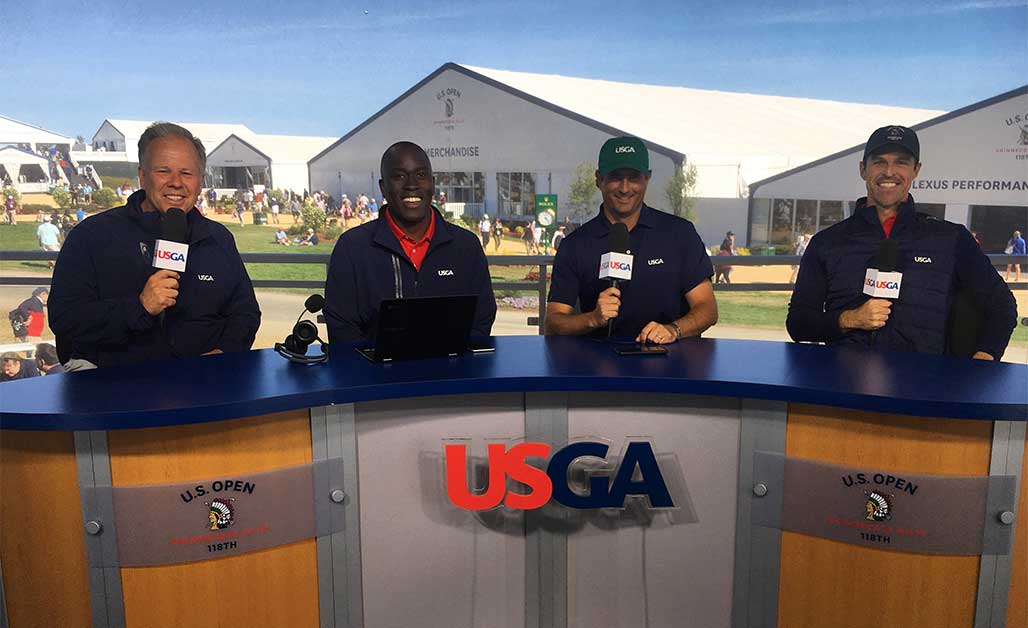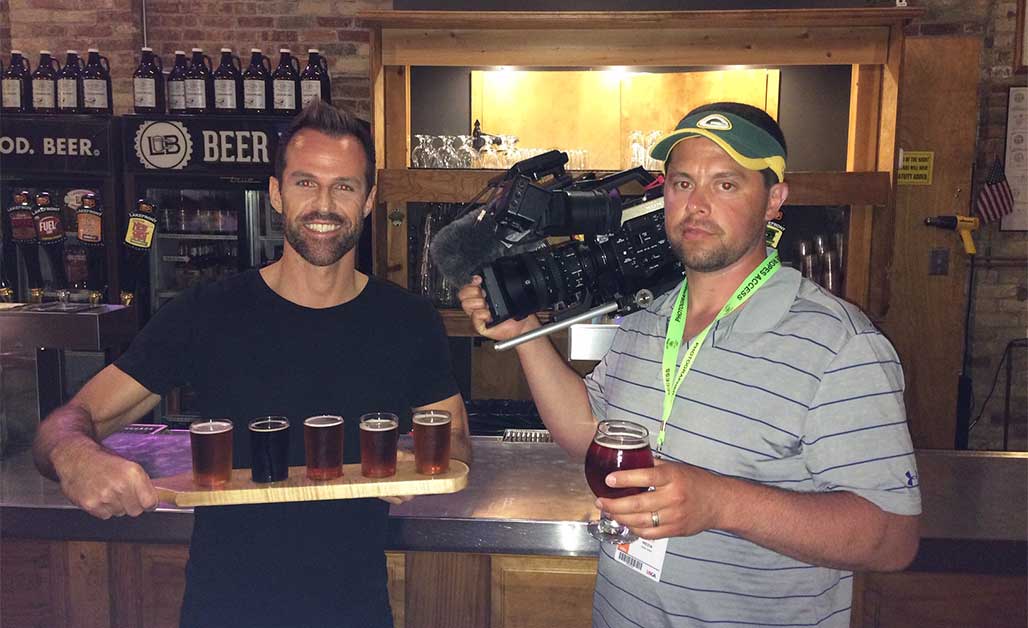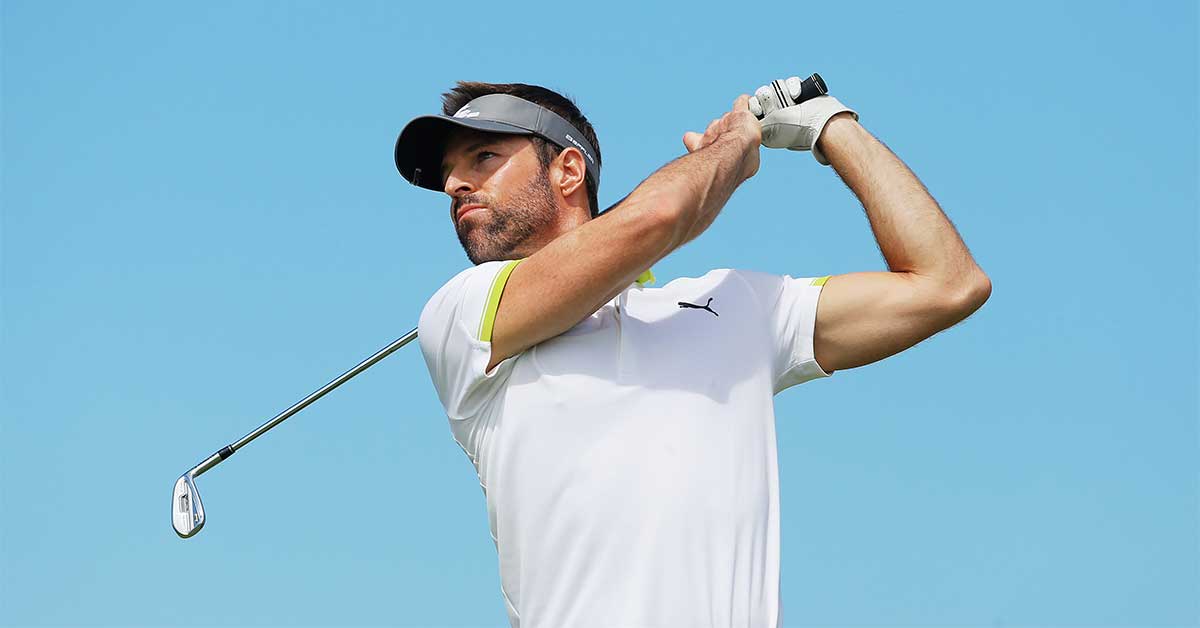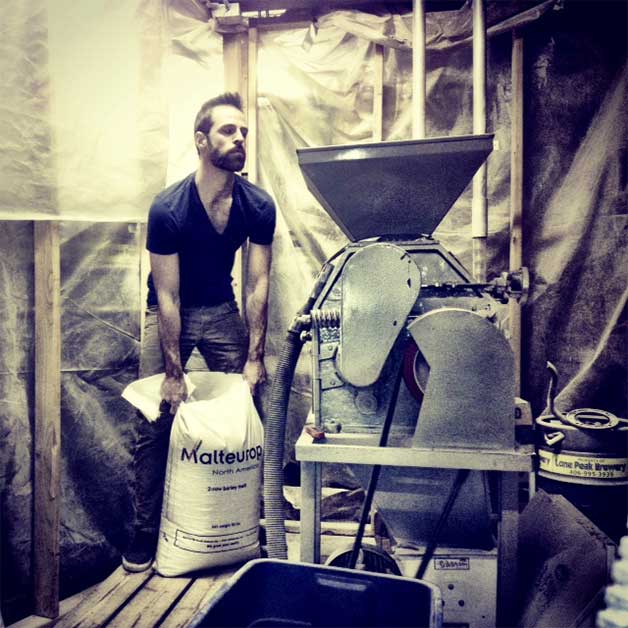Ewan Porter | 36 | Sydney
Two-time tournament winner, author, beer aficionado, TV Broadcaster
Ewan Porter’s tumultuous journey from aspiring Major champion to author, beer aficionado and broadcasting the US Open for the United States Golf Association.
I had a couple of opportunities to do some TV stuff while I was playing and had positive feedback and realised it was something I enjoyed. I knew it would take a lot of hard work, but I didn’t know it would take as much work as it did.
▶ ▶ ▶
In 2008 I did some on-camera work. I remember playing in Omaha, Nebraska, in the morning and then doing course commentary in the afternoon. I played the 2010 Australian Masters and was going OK after a couple of rounds, but because Tiger was playing they had coverage on all-day long and I helped out that week.

Former US Tour winner and broadcaster Dave Marr was the one who gave me some positive feedback that week and encouraged me to pursue a career in broadcasting. I’d won earlier that year on the Nationwide Tour but I’d won twice in three years and failed to get my PGA Tour card both times. I thought maybe that was telling me something and I should start thinking ahead.
▶ ▶ ▶
I worked the World Cup of Golf as a commentator at the end of 2013 but the next golf gig wasn’t until the US Open at Erin Hills in 2017. And it wasn’t for lack of trying. I spent four years really grinding, networking. I met with Fox in LA, I went to CNN in New York just to try to get a foot in the door and meet people face-to-face. It took a long, long, long time but I hung in there and persevered.
▶ ▶ ▶
In 2017 I received an e-mail from Kevin Landy, who is the director of broadcasting at the USGA. He asked if I’d like to do the world feed for the US Open. I didn’t really know what the world feed at the US Open was but I jumped at the opportunity. After the US Open at Erin Hills, I went back to Montana to stay with some friends and then the USGA reached out and asked whether I’d be interested in doing the US Women’s Open two weeks later. After the Women’s Open I was asked to do the world feed at the US PGA at Quail Hollow and everything started snowballing from there. At the PGA, Channel Seven reached out to me for the events in Australia and then I signed a contract with the USGA. PGA Tour Live came up last year because of that but it was all networking. It wasn’t luck that they reached out to me.
▶ ▶ ▶
I’ll start preparing for Pebble Beach a few weeks beforehand. I don’t have a computer, I’ve got this thick folder that I’m constantly writing in. I’ve got the bios and more written down about every single player that has played on the PGA Tour the past three years and I’m always adding to it. That helps with my memory and I do the same with each tournament. This year at Pebble, I’ll look at what took place there in 2000, in 2010, who played in those years, what score won, how the holes played in those years, what the wind directions and temperatures were to relate it to what they’re experiencing now.
▶ ▶ ▶
I was the on-course commentator in February for the AT&T Pro-Am at Pebble and the weather was abysmal. It never got into double digits Celsius all week long, so the conditions and the golf course itself couldn’t be more different to what they’re going to face in the US Open in June. But it’s still nice to be able to use that analogy.

I want to do my own thing as a commentator. My closest thing to a role model would be Ian Baker-Finch because he is non-controversial and I do not want to be controversial at all. You’ve got guys that already do that. I hate being argumentative. I want to enhance the image of the people in the game and do everyone justice.
▶ ▶ ▶
I was 30 when I stopped playing full-time and now that I’m 36 I’ve come to realise how selfish and self-indulgent I was. I only ever had one dream and that was to play on the PGA Tour. I threw all my eggs in one basket. I turned pro the year after I finished high school at 19 years of age and I honestly, naively, ignorantly, stubbornly thought I would be top-10 in the world by 25 and a squillionaire. It just didn’t register that I wouldn’t be that person.
“I turned pro the year after I finished high school at 19 years of age and I honestly, naively, ignorantly, stubbornly thought I would be top-10 in the world by 25 and a squillionaire.”
Ewan Porter
I had this insular vision that I would play in America, be based over there and probably never come back to Australia. That was my whole naive vision of what my professional golf career would entail. I’m glad that it didn’t work out that way because it took me to so many different countries and exposed me to so many different cultures and led me to where I am today.
▶ ▶ ▶
Never playing the PGA Tour is something I’ve had to come to terms with over the years. I made the final stage of Q-school twice but never got through. I was on the leaderboard playing the ninth hole at the Stadium course in the second round at Palm Springs in 2004 and saw my name. I remember thinking everything that a psychologist would tell you not to think of. PGA Tour, millions of dollars, fans adoring you, buy my mum a house – all of this rubbish. Then I sliced it into the water and made triple. I never recovered.
▶ ▶ ▶
The cheque for winning the co-sanctioned Moonah Classic in 2008 was a big cheque for the Nationwide Tour. In US dollars, it was $148,000. The start of the year wasn’t bad but in my last 11 events I missed cuts, withdrew and was disqualified at the Nationwide Tour Championship when I needed to finish top-four to get my card.
▶ ▶ ▶
That’s one I’ll never forget. In the second round, I was playing with a guy and he had gotten four or five of my scores wrong and there was one that I just didn’t pick up on. Although the total was right, on two holes he had me down for 5-4 when it was actually 4-5, so the hole scores were different. I was practising after the round quite pleased that I was playing a bit better only to be told I was disqualified.

Playing bad golf made me feel like a really bad person and it should never, ever get to that point. I see in a lot of golfers that their self-worth is dictated by the score they put on the board and it’s a real pity. That’s become very, very evident to me the past few years. Friends and family don’t care whether you shoot 65 or 75.
▶ ▶ ▶
The whole experience of writing Tour Confidential was incredible. I started writing at the end of 2011 after a shocking year all round. My relationship with Annabel [Rolley] broke down and it felt like everything was crashing down around me. My only objective in writing the book was that one day if I had kids and grandkids they would be able to see what their dad went through.
▶ ▶ ▶
I’d had success, I’d played in Majors, I’d rubbed shoulders with A-List celebrities, I’d seen the glamour side of professional golf. But the reality of it was that 95 per cent of the time I didn’t like the person I was.
▶ ▶ ▶
The first year or two after I released the book it shattered me. Ninety-nine per cent of the feedback was positive and people loved it, but one or two percent within the inner golf circle gave me such a hard time. I never set out at all to throw anyone under a bus or anything but that’s what they said I’d done. Having read a lot of music biographies, I just tried to tell a couple of entertaining stories not thinking it was that bad.
▶ ▶ ▶
In 2008 I started to become intrigued by beer. I was never a fan of Bud Light or Coors or those types of beers, so travelling across America I was able to see and try a whole range of different beers. That inquisitive nature around beer gradually progressed and by the time I stopped playing I was an avid beer geek.
▶ ▶ ▶
When I stopped playing in early 2013, I decided I wanted to travel the world and spend a year learning about beer. I didn’t know what I’d do about it, I just wanted to do that. In the space of 18 months I’d been to 22 US states, 24 countries, filmed a web series on craft beer for the Travel Channel, written a book called Get Hopped and worked at a brewery in Montana for a few months.
▶ ▶ ▶
In that brewery, I did everything from serving beer to brewing beer to cooking food to painting the walls, being a handyman and jack of all trades. It was something I needed to do.
▶ ▶ ▶
The Travel Channel was looking to do a show on craft beer and they sent me away as the north-east expert in the US because I’d lived in New York for a little bit. I went to four different breweries in the north-east and it was one of the most fun things I’ve ever done because when we filmed in the first week of 2014 it was during a polar vortex. We were in Chicago where it was minus-31 degrees Fahrenheit, Buffalo was minus-26, Cleveland was minus-20. Grand Rapids in Michigan was about the same. It was stupidly cold and the one thing that was very evident was that any weather is beer-drinking weather because there were hundreds of people in each venue we went to.
 ▶ ▶ ▶
▶ ▶ ▶
I went to a monastery outside Prague in the middle of winter at the end of 2013. That place has been there since the 11th century and the brewing process they use is so different to the new techniques they’re using in America.
▶ ▶ ▶
IPA is still the trendy craft beer and they’re great, but I’m a huge stout fan as well. My dad always drank Tooheys Old growing up and I hated the look of it. Over time my palette matured and I started to appreciate what went into a beer a little bit more.
▶ ▶ ▶
My favourite beer of all time is from a Japanese brewery called Hitachino; they have an espresso stout that breaks barriers for me. One of the best beers I’ve ever had was called Siperia Stout taking the Viking cruise line from Helsinki to Tallinn in Estonia. It was 10 or 11 per cent alcohol, a Finnish beer, and I remember sitting there with a couple of locals and realising that beer is the universal language. If you’re sitting down to a beer anywhere in the world there is a mutual appreciation and you can have a conversation with anyone. Wherever I went I would sit at the bar and get chatting to people. It’s a great way to start a conversation.
“If you’re sitting down to a beer anywhere in the world there is a mutual appreciation and you can have a conversation with anyone.”
Ewan Porter
Golf is my bread and butter. I love it and I will continue to do whatever I can forever, but my big goal is to get into telling human-interest stories outside golf. That’s where my true passion lies. Every human has a story to tell. I filmed a pilot with the PGA Tour in October last year in Brooklyn that will be pitched to either CNN or Discovery that is character-driven. In a lot of ways it mirrors my life, rediscovering my passion for the game through connecting with people from all over the world and using my dad’s passing last year as an inspiration.
▶ ▶ ▶
I’ve got a trick-shot where – with a full swing – I smack the top of the ball with my driver and it rolls out about 15 or 20 feet like a bump and run. Back in my rebellious days I did some crazy things. I stood on the first tee in a practice round at St Andrews at the 2010 British Open and hit that shot. The group in front was D.A. Points, George McNeill and a couple of others and they were 60 metres down the fairway. I dropped a ball on the first tee with people everywhere and I pulled out driver and said that I wasn’t going to wait, that I was going to hit it over their heads. My caddie Grant Naylor knew what I was doing but everyone else thought I was out of my mind. I did it and the ball dribbled about 10 feet along the tee.
▶ ▶ ▶
When I was a junior I was always hotheaded. Up until I was 27 or 28, I was fairly hotheaded but then I realised it wasn’t a great look so I started bottling things up, which wasn’t me either. When I was playing I never really found that happy medium of knowing how to deal with things when they went wrong.
▶ ▶ ▶
I’m pretty confident that if I was to go back out there and play full-time, because of my overall perspective on life, I’d be much better. I’d still slam the odd club because hitting bad shots frustrates me, but I’d deal with it a hell of a lot better because of the experiences I’ve had over the past few years.
Ewan Porter spoke with Tony Webeck



